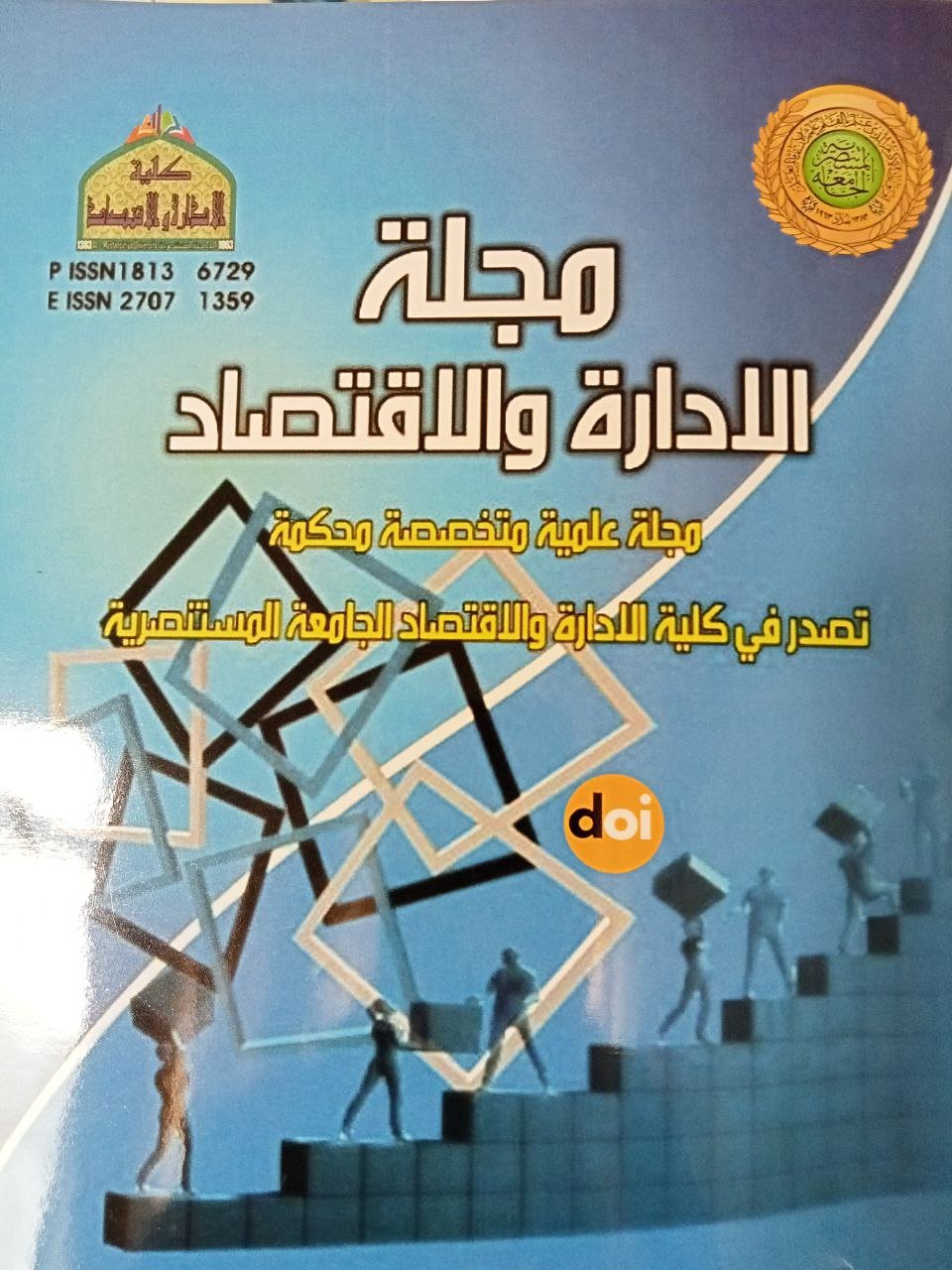"تحديد تاثير التعليم الالكتروني وتطبيقاته في الاداء الاكاديمي للجامعات"
DOI:
https://doi.org/10.31272/jae.i142.1024الكلمات المفتاحية:
التعليم الالكتروني، الاداء الاكاديمي، تكنلوجيا المعلومات، الاهداف الاستراتيجيةالملخص
ركزت هذة الدراسة على دور التعليم الالكتروني واثره في الاداء الاكاديمي والذي اصبح اليوم الشغل الشاغل في ظل مواجهة اعتى وباء صحي يعصف بالكرة الارضية راح ضحيته مئات الالاف من البشر الا وهو وباء (COVID19). اذ تركز هذة الدراسة حول ماقدمته مدخلات الاداء الاكاديمي لمخرجات التعليم الالكتروني المتمثلة بالبنية التحتية ومهارات استخدام الحاسوب والمحتوى والاستقلالية باستخدام التكنلوجيا الحديثة حيث استخدم الباحث مجموعة من الاداوات والاساليب الاحصائية المتمثلة بتحليل العامل التوكيدي ومعامل الثبات الوسط الحسابي والانحراف المعياري اضافة الى عدة مقاييس اخرى سيرد ذكرها لاحقا بالتفصيل حيث يرى الباحث مجمل الادبيات حول الموضوع مدار بحثنا هذا وشملت العينة احد اهم الجامعات العراقية في بغداد الا وهي الجامعة المستنصرية حيث استعرض الباحث مجموعة من الاستنتاجات للنهوض بالواقع الاكاديمي في ظل التكنلوجيا المتوفرة والمتاحة للطالب والاستاذ وللهيئة الادارية . ان التعليم الالكتروني اختصر المساحات الجغرافية بين الطالب والاستاذ . بروز انزعاج كبير من قبل الطلبة بسبب الانقطاع المستمر للتيار الكهربائي اثناء التعليم الإلكتروني . ان الطلبة على استعداد لتعلم المهارات اللازمة المطلوبة للنجاح في التعليم الإلكترونيكذلك لوحظ ان الهيئة التدريسية في الجمعة المستنصرية تحرص على تحسين أدائها تحسينا مستمراً . وان هناك اهتمام دون المستوى المطلوب من قبل رؤساء الاقسام بالمقترحات التي يقدمها اعضاء الهيئة التدريسية والمتعلقة بجودة الأداء التعليمي. ان تلك التكنلوجيا اذ ما استغلت بالصورة الصحيحة ورسمت الاهداف الاستراتيجية للواقع الجامعي فانها ستحقق ثورة في واقع التعليم الالكتروني وسيوفر فارق الجهد والوقت وستختصر جغرافياً الزمن والمسافة لايصال المنهج العلمي في ظل رقابة معينة توضع كاساس علمي لمتابعة الامر .
المراجع
المصادر العربية
النعيمــــي ، محـــمد عبد المرتفع ، طعـــمة حسن ياسين، الاحصاء التطبيقي ، الطبعة الاولى، دار وائل للنشر، عمان، الاردن ، 2008 .
اموري ، هادي كاظم ، خالد ضاري الطائي ، عبدالمنعم كاظم الشكري ، الاحصاء التطبيقي اسلوب تحليلي باستخدام. SPSS، الطبعة الاولى، دار وائل للنشر، عمان، الاردن ، 2013.
جـــــودة ،محفوظ، التــــحليل الاحصائي المتقــــدم ، الطبعة الثانية ، دار وائل للنشر، عمان، الاردن ، 2010.
عبدالمنعم ، ثروت محمد ، الانحدار ، الطبعة الاولى ، مكتب الأنجلو المصرية، القاهرة ، مصر ، 2005.
تيغزة ، محمد بوزيان ، التحليل العامــــلي الاستكشافي والتوكيدي مفاهيمهما ومنهجيتهما ، الطبعة الاولى ، دار المسيرة للطباعة والنشر ، عمان ، الاردن ،2012 .
حــــجاج ، غانم ، التحليل العامــــلي في العلوم الانسانية والتربوية نظريا وعمليا ، الطبعة الأولى ، مرتفعم الكتب ، القاهرة ، مصر ، 2012 .
الموقع الرسمي للجامعة المستنصرية على الانترنت .
الكتب والدراسات العربية
ضاري ، وعد سنجار ، تاثير اليقضة الاستارتيجية في الاداء الجامعي / بحث استطلاعي جامعة الانبار ، كلية الادارة والاقتصاد / جامعة بغداد ، رسالة ماجستير، 2019.
الهموندي ، وردة عبد الخالق ، دور الذكاء الشعوري في تفوق الأداء الجامعي في إطار أساليب اتخاذ القرارات، كلية الادارة والاقتصاد ، جامعة بغداد ، راسلة ماجستير ، 2013.
خضير ، ليلى عبد الله ، تاثير القيادة المتسامية في الاداء الاكاديمي ،كلية الادارة والاقتصاد جامعة بغداد رسالة ماجستير ،2019.
النوري ،عبدالسلام علي حسين ،تحليل ابعاد الاداء الجامعي وفقا لمعايير الجودة والاعتماد الاكاديمي ،كلية الادارة والاقتصاد – جامعة بغداد ، رسالة ماجستير ،2013.
سليمان، سناء محمود ، "تطبيق انموذج التميز الأوربي EFQM لتقييم اداء مستشفى النعمان العام" ،بحث تطبيقي، دراسة مقدمة للحصول على "درجة الدبلوم العالي في ادارة الاعمال/ قسم الرقابة والتفتيش" جامعة بغداد/كلية الادارة والاقتصاد،2014.
سعيد، سناء عبد الرحيم ،"تصميم نظام تقويم الاداء الاستراتيجي للجامعات باعتماد تقنية بطاقة الدرجات المتوازنة دراسة تطبيقية في جامعة بغداد"، اطروحة مقدمة للحصول على "درجة دكتوراه فلسفة في ادارة الاعمال" جامعة بغداد/كلية الادارة والاقتصاد،2005.
أبو لبدة، سبع محمد، (1982)، (مبادئ القياس النفسي والتقويم التربوي)، ط2، جمعية عمال المطابع التعاونية، عمان- الأردن.
بني حمدان، خالد محمد، (2009)، (الإستراتيجية والتخطيط الإستراتيجي- منهج معاصر)، دار اليازوري العلمية للنشر والتوزيع، عمان- الأردن.
العابدي، علي رزاق والعبادي، هاشم فوزي دباس، (2007)، (استخدام أسلوب المقارنة المرجعية في تقويم الأداء الجامعي- دراسة مقارنة بين كلية الإدارة والاقتصاد/ جامعة الكوفة وكلية الإدارة والاقتصاد جامعة القادسية)، مجلة القادسية للعلوم الاقتصادية والإدارية المجلد (9)، العدد (3)، كلية الإدارة والاقتصاد- جامعة القادسية.
المصادر الاجنبية
Berge , Z. L., & Muilenburg, L. Y. (2013). Handbook of Mobile Learning. New York & London: Routledge.
Bersin, J. (2004). The blended learning book: Best practices, proven methodologies, and lessons learned. SanFrancisco, CA: John Wiley & Sons, Inc.
Cross, J. (2004). An informal history of eLearning. Emerald, 1-8.
Daniel, S. J. (2014). Open, Distance and Online Learning: A Brief History. International Conference onmerging Technologies in Education and Computer Science.
Dean, C., & Whitlock, Q. (1992). A handbook of computer-based training. Based Training. New York, NY:Nichols Publishing Company
Friesen, N. (2012). Defining Blended Learning.
Garrison, R., & Anderson, T. (2003). E-learning in the 21st Century: A Framework for Research and Practice.
Hamari , J., Koivisto, J., & Sarsa , H. (2014). Does Gamification Work? — A Literature Review of Empirical Studies on Gamification. 47th Hawaii International Conference on System Science. Hawaii: IEEE Computer Society>
Horton, W. K. (2001). Leading E-Learning. Alexandria, VA: ASTD.
Kovaleski, D. 2004. Blended learning in focus. Corporate Meetings & Incentives, 23: 35-36.
learning. Phoenix, USA. Retrieved April 24, 2007.
Moore, J. L., Dickson-Deane, C., & Galyen, K. (2011). e-Learning, online learning, and distance learning environments: Are they the same? ScienceDirect, 1-4.
Sheridan, D., Gardner, L. & White, D. (2002). Cecil: The first web-based LMS. Proceedings of ASCILITEAuckland 2002.
Shimura, K. (2006). Computer-based learning and web-based training: A review forComputer-based learning and web-based training: A review for. 59-63.
Tai, L. (2008). Corporate E-Learning: An Inside View of IBMs Solutions. New York, NY: Oxford University .

التنزيلات
منشور
إصدار
القسم
الرخصة
مجلة الإدارة والاقتصاد هي مجلة مفتوحة المصدر حيث تكون جميع محتوياتها مجانية. تخضع مقالات هذه المجلة لشروط ترخيص المشاع الإبداعي المنسوب إلى المؤلف (CC-BY 4.0) (https://creativecommons.org/licenses/by/4.0/legalcode) الذي يسمح للمرخص لهم دون قيود بالبحث عن النص الكامل للمقالات أو تنزيله أو مشاركته أو توزيعه أو طباعته أو ربطه به، وفحصه للفهرسة وإعادة إنتاج أي وسيلة للمقالات بشرط أن ينسبوا إلى المؤلفين الفضل في ذلك (الاستشهاد). تسمح المجلة للمؤلفين بالاحتفاظ بحقوق الطبع والنشر لمقالهم المنشور.
. Creative Commons-Attribution (BY)









